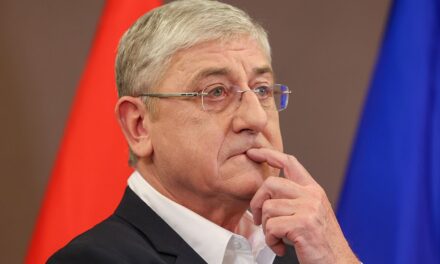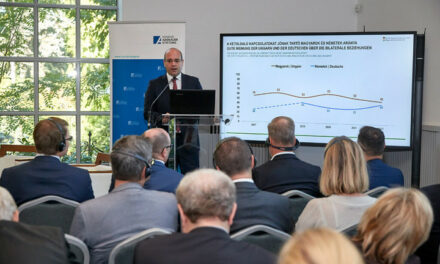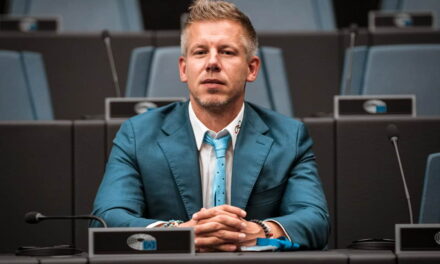Euronationalism wants to break with the current consensus that causes a competitive disadvantage.
Euronationalism does not promise an easier or more comfortable life - on the contrary, it demands sacrifice and effort to save European civilization. It offers a political and cultural program that returns to the roots of European civilization, restores the principle of distinction and hierarchy and rejects the flattering but empty egalitarianism, revives the importance of virtues and the culture of sacrifice, provides protection against external threats - laid down a the basic principles of a new direction Széchenyi Prize-winning conservative philosopher András Lánczi Demeter Szilárd , writer, political analyst, publicist, director general of the Hungarian National Museum, and Gábor Megadja the Index.
"European civilization has reached its lowest point in history. However, this crisis is not primarily economic or political in nature, but cultural. While on the surface our continent still shows signs of relative prosperity and stability, deep down there are already signs of collapse"
- write the historians of ideas in their introduction.
The authors state: “Europe's dominance in world history is really only a brief episode. Until the Renaissance, our continent was considered a periphery compared to the developed eastern empires. What made him unique was not his wealth, but the fact that he could call himself free - in contrast to the despotism of the East. However, this European ideal of freedom was buried by the fashionable (in other words: modern) ideological currents that deny reality and oppose it."
According to them, the current crisis of our civilization manifests itself most sharply in three areas:
"1. In a demographic collapse that can no longer be remedied by administrative or financial means alone.
A civilization that cannot ensure its own biological survival is doomed.
Insight into this should precede any other strategy or consideration. This is a law of nature that cannot be avoided, it is not possible to find another way to survive.
2. In cultural self-surrender, during which we not only denied our past, but also lost our ability to differentiate between right and wrong, beautiful and ugly. Behind the slogans of "diversity" and "inclusion" is actually the elimination of European culture.
The problem is not with plurality, but with the abolition of all distinctions.
What is needed is not the rehabilitation of "values" - this is a relativistic term, everyone chooses "values" as they like, like clothes in a rummage bag - but rather the restoration of evaluation.
3. In technological dependence, which is no longer just an economic but a civilizational issue. Europe, which once had the power to change other continents as an engine of discovery, has now become a secondary player that only follows and copies the developments of others. At the moment, Europe is not a determining factor either in terms of technological innovation, (after the slaughter of the German car industry) or industry, or military capabilities:
the USA and Asia have also overtaken us.”
The authors believe that according to the current European consensus, the continuous growth of welfare and
the unlimited satisfaction of individual desires ensures social peace.
However, according to them, this consensus cannot be maintained, because all this undermines the foundations of civilization, abolishes society's natural self-defense mechanisms, such
creates a culture of comfort in which no one is willing to make sacrifices for the community,
political hedonism encourages a selfish, nihilistic and anti-religious individual life, so they propose a new approach: the path of Euronationalism.
"Euronationalism is a modern rethinking of the neo-nationalism formulated by Kuno Klebelsberg a hundred years ago. Just as Klebelsberg realized that the Trianon Hungary could only remain viable if it gained "cultural supremacy", so today the whole of Europe must face the same challenge: either it will be able to undergo cultural and spiritual renewal, or it will lose its historical and future-shaping role. Klebelsberg's program was not based on aggressive nationalism, but on the methodical development of literacy, science and education. Euronationalism follows the same constructional logic:
it does not aim at confrontation with the rest of the world, but at mobilizing Europe's internal cultural reserves and strengthening its civilizational foundations.
For this, the current Brussels horizon must be expanded: as long as Europe is a world-shaping force as an idea, the European Union is a narrowed state of consciousness," they write.
They add: Euronationalism wants to break with the current consensus that causes a competitive disadvantage. It does not promise an easier or more comfortable life - on the contrary, it demands sacrifice and effort to save European civilization. It offers a political and cultural program that returns to the roots of European civilization, restores the principle of distinction and hierarchy, and
it rejects the flattering but empty egalitarianism, revives the importance of virtues and the culture of sacrifice, provides protection against external threats.
The basic principles of the program are formulated in ten items:
"1. Stopping civilizational self-abandonment
European civilization can only survive if it returns to its original cultural and spiritual foundations and breaks with the current practice of self-liquidation. We must get rid of the dogma of multiculturalism and reinterpret European identity.
The "multicultural anyone" propagated by the European elite lives in the continuous present. On the other hand, the European citizen is in history and tradition.
He knows not only where he came from, but also why he is where he is. Let's ask again: what makes us European, what distinguishes us from everyone else? We need to clarify the concept of "Europeanness", which is currently being used as a rubber band - and it should be clarified in such a way that everyone who claims to be European can feel proud, not cheap.
2. Culture as a selection and source of meaning
Culture in its original sense is differentiation and selection - this is opposed to current relativism and equalizing efforts. European civilization can only be renewed if it returns to the principle of quality selection in all areas of culture.
There is no value-neutral culture
- evaluates according to the nature of culture. And it really doesn't matter on what basis he does it. European art and science of all times are the source of the European outlook on life, self-awareness, knowledge and love of life and the embodiment of harmony between man and nature. The meaning of life is realized through culture.
3. National cultures as building blocks
European unity cannot be achieved by eliminating national cultures, but by strengthening them.
It is time to eradicate the practice of self-colonization, which is present regardless of political dividing lines. Following the French example, every nation must prioritize its own cultural and scientific traditions. The dominance of the English language must be replaced by the diversity of European languages.
4. Elite education and excellence
In education, the practice of leveling massification must be discontinued. We must return to real elite education and the cult of excellence, which was the centuries-old tradition of European universities. The idea of the university (universitas) must be resurrected - regardless of the institutional framework -,
the transfer of knowledge (trade!) must be enforced and political activism must be discouraged.
The effort to understand the whole, the love of wisdom, must be emphasized in education.
5. Eradication of the cult of comfort
European civilization can only remain viable if its citizens are ready to make sacrifices for it.
There is no renewal without eliminating consumerism and political hedonism, as well as convenience.
In contrast to the passive culture-consumer approach, we believe in the active and creative culture-carrying European citizen.
6. Demographic turn
The future of Europe is primarily a demographic issue. In addition to supporting family formation and having children, a cultural environment must be created that makes self-sacrifice natural for the next generations.
If there is no physical-biological future, there is none.
7. Technological sovereignty
The key to European independence is regaining technological independence.
This requires a complete paradigm shift in the innovation system, starting from encouraging risk-taking to transforming the regulatory environment.
8. Fortress Europe concept
Protecting the physical and cultural boundaries of European civilization is vital.
This does not mean isolation, but conscious control over what and who can enter Europe.
9. Hierarchy
We must break with cultural relativism. The traditional European understanding of culture is hierarchical – there are higher and lower cultural practices and this needs to be re-stated.
The daily life practice of a careful farmer supporting his family is not the same as that of a drug dealer.
10. Revival of Martial Virtues
Human life gains significance only in belonging to the community. However, everything that exists finds itself in a vortex of conflicts. The conflict is inescapable, so human life is condemned to constant alertness.
Only the hubris of liberal thought denies that human life is, by its very nature, an irreducibly natural being and therefore a competitive and combative being.
It is self-delusion, a denial of reality, if we believe that the European man is able to make his own convictions universal at the same time through the mere increase of his knowledge. It is also an ideological denial of reality if someone believes that the organization of people into national communities is only emotionally charged. Every nation is a cultural, economic and political community that contributes to the formation of the individual's self-awareness. A civilization can only survive if its citizens are ready to defend it even at the cost of their lives.
Without the revival of national defense virtues and patriotism, Europe will remain defenseless.
No matter how the events of world politics turn out, only the Europeans will want to protect Europe, and only the Hungarians will want to protect Hungary." - observed the Mandiner.
Cover image: Illustration / Pixabay













